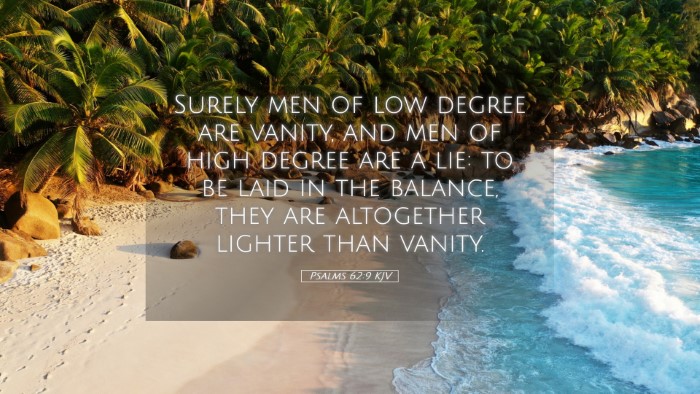Psalms 62:9 - Commentary Summary
Psalms 62:9 states: "Surely men of low degree are vanity, and men of high degree are a lie: to be laid in the balance, they are altogether lighter than vanity." This verse offers poignant reflections on the nature of humanity, wealth, and the fleeting nature of earthly status. Below is a compilation of insights from respected public domain commentaries, providing deep understanding for pastors, students, theologians, and Bible scholars.
Contextual Understanding
The Psalmist, traditionally attributed to David, expresses profound trust in God's power and sovereignty throughout the chapter. This specific verse contrasts the worthlessness of human beings in terms of their social standing—both lowly and exalted. The declaration of both classes being "vanity" and "a lie" raises important theological implications regarding human reliance on worldly status.
Insights from Matthew Henry
Matthew Henry remarks on the duality of humanity's status. He emphasizes that both the rich and poor are ultimately nothing compared to God's greatness. He states that “men of low degree are vanity” implies their transient power and influence, while “men of high degree are a lie” points to the deception that wealth and status can provide genuine satisfaction or stability. In essence, Henry argues that all human distinctions, when laid against God’s eternal truths, are found wanting.
Key Themes from Henry
- Human Fragility: All people, regardless of their societal rank, possess inherent fragility.
- Divine Sovereignty: True worth is found only in God.
- Temporal vs Eternal: The wealth and power of man are fleeting and ultimately irrelevant in the eyes of God.
Insights from Albert Barnes
Albert Barnes provides a more analytical perspective, examining the terms "vanity" and "a lie". He notes that the Hebrew words used suggest emptiness and deceit. "Vanity" signifies something that is neither substantial nor enduring, while "a lie" reflects falsehood, indicating that the honors and riches of the world do not equate to truth or lasting value. Barnes emphasizes that both the humble and the illustrious, when measured against divine scales, reveal a commonality—their ultimate insignificance in terms of spiritual worth.
Key Themes from Barnes
- Human Equality: Both the rich and the poor stand equal before God in their inability to offer anything of eternal value.
- Human Efforts vs Divine Truth: Reliance on human efforts frequently results in disappointment when compared to God’s unchanging nature.
- Call to Authenticity: A reminder for believers to seek authentically through faith, rather than through worldly accolades.
Insights from Adam Clarke
Adam Clarke expands on the allegorical interpretation of the Psalm. He explores the idea that the balances mentioned are divine judgments that weigh the deeds and motives of the heart rather than the external appearances dictated by society. Clarke mentions that the terms signify a balance that reveals the vanity of all earthly statuses. He further emphasizes that the notion of "lighter than vanity" implies that once humanity’s status is stripped away, what remains is a stark reality—a reminder of human limitations and the greatness of God.
Key Themes from Clarke
- Judgment and Accountability: There is a divine weight upon human actions that transcends earthly judgments.
- Spiritual Reflection: Encourages self-examination of one's motives, pointing to the inner spiritual state rather than outward appearance.
- Rejecting False Security: Encourages believers to reject the false security provided by wealth or status and seek fulfillment in God alone.
Theological Reflections
This verse serves as a critical reminder for both ministers and laypeople, reinforcing the understanding that human achievements are ultimately ephemeral. It prompts a heart of humility and dependence on God. Just as the Psalmist reflects on his own reliance on God for salvation and security, believers are called to refocus their trust away from societal values towards the eternal character of God.
Contemporary Application
In the modern context, where society often glorifies success and status, Psalms 62:9 calls for a radical re-evaluation. Pastors can draw on this scripture to teach congregations about the dangers of materialism and the importance of cultivating spiritual wealth. It challenges all to reflect on the motivation behind their pursuits and encourages a lifestyle aligned with God’s truths rather than societal expectations.
Conclusion
The richness of Psalms 62:9 lies in its stark contrast between human vanity and divine truth. With insights from revered commentators, this verse illuminates the essential Christian understanding of humility, dependence on God, and the reassessment of worldly values. It is a clarion call to live authentically, seeking true worth in the eyes of God rather than the fleeting accolades of humanity.


